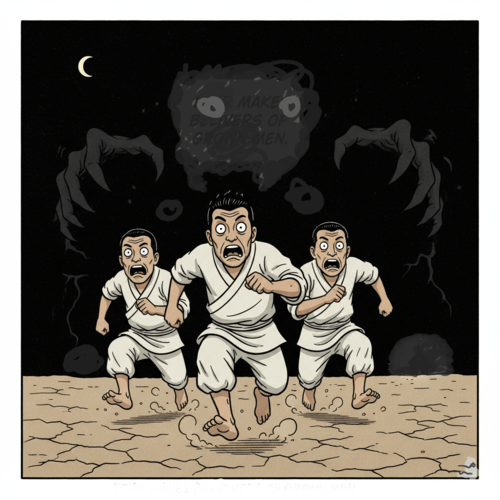Is Fear the Foundation of Religion?
WHY BERTRAND RUSSELL GOT CHRISTIANITY WRONG
Bertrand Russell’s famous claim still echoes through sceptical discourse today. In his 1927 essay Why I Am Not a Christian, the famous philosopher said religion is “based primarily and mainly upon fear—fear of the mysterious, fear of defeat, fear of death.” For many modern readers, Russell’s claim still settles the question. Religion equals fear management. Case closed.
But is fear really the foundation of religion?
The honest answer is: yes and no. Russell saw something real—but he mistook the counterfeit for the authentic.
RUSSELL WASN’T ENTIRELY WRONG
Let’s be honest—fear is foundational to much of human religion. Denying this weakens our case and makes us look naïve. History overflows with examples.
Consider ancient Baal worship, where adherents mutilated themselves hoping to appease a volatile storm god. Or Aztec religion, which demanded industrial-scale human sacrifice to prevent cosmic catastrophe. Move to the present: the prosperity gospel traffics in fear of poverty and divine rejection, teaching believers that sickness or financial struggle signals God’s displeasure. Folk religions worldwide claim God is capricious and dangerous—requiring endless rituals, offerings, and superstitions to avoid catastrophe.
Russell observed this accurately. But here’s what he missed: fear produces compliance, not devotion. It generates appeasement, not worship. It creates slaves, not children. Fear-based religion is transactional—pay the protection money, avoid the curse, perform the ritual. There’s no love in it, no genuine relationship, no transformation.
So the question isn’t “Does religion involve fear?” The real question is: “Does your worldview remove fear—of death, of judgement, of meaninglessness—or does it merely manage it?”
This reframe exposes the poverty of Russell’s critique. He diagnosed a symptom but mistook it for the disease itself.
HOW OTHER WORLDVIEWS RESPOND TO FEAR
If fear is such a fundamental human problem, how do non-Christian worldviews address it?
Buddhism teaches that fear arises from attachment. Face impermanence without clinging, and fear dissolves through detachment and enlightenment. Release desire, and fear will dissolve. It’s a noble idea—but it sidesteps the question of whether death and judgement are real. But the cure costs us our humanity. To escape fear, we must extinguish desire itself—including the desire for love, justice, and meaning. And it doesn’t truly answer death; it only proposes escape from the cycle of rebirth.
Secular humanism’s answer sounds liberating at first: “No gods, no masters, no eternal punishment—relax. Create your own meaning.” It removes ecclesiastical tyranny and supernatural threats. But existential dread doesn’t disappear on command. When you realise you’re a cosmic accident heading toward non-existence, and all your meaning-making will be erased with the heat death of the universe, you’re back where you started.
All these systems seek to silence fear without satisfying justice or restoring relationship. They seek to eliminate fear by diminishing reality—either dissolving the self (Buddhism) or dismissing ultimate meaning (secularism). Neither satisfies the human heart, because neither actually resolves what we fear. They just teach us to stop asking the questions.
They try to numb the conscience but cannot still it. None can look the grave in the eye and say, “Death is defeated.” Only Christ can.
THE CHRISTIAN ANSWER: RECONCILIATION, NOT ELIMINATION
Christianity doesn’t deny legitimate fears—it answers them through the gospel. This distinction is everything.
We Acknowledge Real Guilt: Russell assumed religious fear was irrational projection. But the Bible says: we should fear judgement—we’re actually guilty. God’s holiness is real. Our rebellion is real. Justice demands an answer. The gap between Creator and creature isn’t a neurosis to overcome; it’s a chasm carved by sin.
This is honesty, not manipulation. The gospel doesn’t begin with false comfort or therapeutic reassurance. It begins with truth: we have real reasons to fear.
We Proclaim Real Reconciliation: But here’s where everything changes: God himself bore the judgment. Christ absorbs the wrath we deserved. Propitiation means fear is answered, not merely suppressed or reframed. The Father’s love is so fierce that He satisfies His own justice to redeem His children.
The result? “There is therefore now no condemnation for those in Christ Jesus” (Romans 8:1). Fear of judgment doesn’t just get managed or minimized—it’s transformed into reverent awe. We stand before infinite holiness not as criminals awaiting sentence, but as adopted children welcomed home.
Death Loses Its Sting: “O death, where is your victory? O death, where is your sting?” (1 Corinthians 15:55). Christianity uniquely claims resurrection—not reincarnation (Buddhism’s endless cycle), not annihilation (secularism’s void), but bodily restoration in a renewed creation. Death becomes a defeated enemy, not the final word. Christians throughout history have faced martyrdom singing. Not because they suppressed their fear, but because resurrection was more real to them than the executioner’s blade.
Meaning Grounded in Reality: We’re not creating meaning from nothing, like the secular existentialist project requires. We’re discovering meaning already there—created in God’s image, redeemed for His purposes, part of a cosmic story with a guaranteed ending. When Paul writes that “all things work together for good for those who love God” (Romans 8:28), he’s not offering a platitude. He’s describing the bedrock architecture of reality under Christ’s sovereign rule.
Joy Independent of Circumstances: This is crucial: Christian joy isn’t happiness-when-things-go-well. It’s resurrection joy—the kind that sings hymns in prison (Acts 16), that counts trials as grace (James 1:2), that rejoices in suffering because suffering produces endurance (Romans 5:3). Our hope isn’t circumstantial. It’s anchored in the unchangeable character of God and the finished work of Christ.
Community, Faith, and Hope in Suffering: We don’t face trials alone. The church is a suffering-and-rejoicing body where “if one member suffers, all suffer together” (1 Corinthians 12:26). Faith enables us to “walk through the valley of the shadow of death” (Psalm 23) with confidence—not because shadows aren’t dark, but because the Shepherd is present. Hope anchors the soul (Hebrews 6:19) precisely when circumstances scream despair.
True faith doesn’t erase fear by denial—it conquers it through redemption. The Gospel doesn’t tell us to stop fearing; it tells us whom to fear rightly. And then, the One we feared becomes our Saviour.
IT IS FINISHED
So let’s return to Russell. He was half-right—fear drives false religion. Superstition, manipulation, and spiritual abuse all weaponise terror. But he never grasped what makes Christianity different, perhaps because he never truly encountered the gospel itself.
The God of Scripture doesn’t demand appeasement; He provides atonement. The cross shows us how divine justice is satisfied and divine mercy is offered. There, perfect love truly casts out fear—not by pretending evil and death are illusions, but by conquering them.
Because of Him, the believer’s deepest fears—of death, judgement, and meaninglessness—are replaced with awe, gratitude, and unshakable peace.
Fear was the starting point. Grace is the foundation. And perfect love is the end.
Every worldview must face the same question: Does your worldview actually remove fear—or only seek to distract you from it?
IS FEAR THE FOUNDATION OF RELIGION? RELATED FAQs
What did John Calvin actually say about fear and religion? Calvin distinguished between “servile fear” (the dread of a slave before punishment) and “filial fear” (the reverence of a child before a loving father). In the Institutes, he argued servile fear may initially drive someone toward God, but the Holy Spirit transforms this into filial fear—a profound respect mixed with love and trust. True religion, Calvin insisted, is marked not by cowering but by confident approach to God through Christ. This is why Reformed worship emphasizes both God’s transcendence and His covenant faithfulness.
- How do Christian apologists respond to the “projection theory” of religion? RC Sproul flipped the argument: if we invented God as a fear-response, why would we invent a God who sees our every thought, demands holiness, and judges sin? A projection would give us a cosmic therapist or a manageable deity—not the God of Scripture who “is a consuming fire” (Hebrews 12:29). Sproul argued atheism itself is often the projection—denying God because His existence is inconvenient, not because the evidence is lacking. The fact that biblical faith includes fearful elements (judgement, holiness, accountability) actually argues against it being mere wish-fulfillment.
- Didn’t Jonathan Edwards preach “Sinners in the Hands of an Angry God”? Doesn’t that prove Reformed Christians do use fear? Yes, and we shouldn’t apologise for it—but we must understand what Edwards was doing. He preached the reality of judgement to people anesthetised by cultural Christianity who treated grace as cheap presumption. Edwards wasn’t founding religion on fear; he was using the law to expose false security before presenting Christ as the only refuge. His broader ministry emphasised the “beauty of divine things” and “religious affections” rooted in love for God. Fear was the alarm that woke people to their need; the gospel was the answer that saved them.
What’s the difference between “fear of the Lord” in Scripture and the fear Russell criticised? The “fear of the Lord” in Proverbs and throughout Scripture is never mere terror—it’s the recognition of reality that leads to wisdom. It’s the awe we feel standing at the edge of the Grand Canyon, not the panic of someone fleeing a predator. Cornelius Plantinga calls it “the beginning of wisdom” because it properly orients us to who God is and who we are. This fear produces worship, obedience, and intimacy—not the cowering distance that Russell rightly critiqued in pagan religion.
- How did CS Lewis address this question? Lewis argued in The Problem of Pain that we fear God the way a man loves a woman—it’s not about terror but about being overwhelmed by something greater, more beautiful, and more real than ourselves. He distinguished between “fear” as dread and “fear” as awe-filled wonder. Lewis also pointed out that the universal human sense of moral guilt (which produces fear of judgement) actually argues for God’s existence—it’s evidence of the moral law written on our hearts (Romans 2:15). If Russell were right that fear created God, we’d expect humans to invent deities who approve of everything we do.
- What do Reformed scholars say about Russell’s own psychological motivations for rejecting Christianity? Several scholars, including Alister McGrath, have noted that Russell’s personal life—marked by failed marriages, complicated relationships, and a patrician disdain for traditional morality—may have motivated his intellectual rejection of Christianity. Russell needed God not to exist so that his moral framework could hold. Reformed philosopher Alvin Plantinga would call this a “genetic fallacy” in reverse: Russell accused Christians of believing from fear while never examining whether his own atheism stemmed from the desire to avoid moral accountability. The question cuts both ways: whose worldview is really driven by fear?
How does the Reformed understanding of “covenant” change the fear discussion entirely? This is the game-changer Russell never grasped. Reformed theology centres on covenant—God’s binding promise to be our God and make us His people. Unlike pagan religions where we’re always uncertain of divine favour, covenant means God has committed Himself by oath (Hebrews 6:17-18). We’re not appeasing an unpredictable deity; we’re trusting the faithful promises of the covenant-keeping God. This is why Reformed Christians speak of “covenant children” and “covenant confidence”—we’re in a relationship defined by God’s sworn commitment, not our performance. Fear as anxiety dissolves; fear as reverence flourishes.
IS FEAR THE FOUNDATION OF RELIGION? OUR RELATED POSTS
Editor's Pick

GPS Without Eyes: How Ants Silently Shout Intelligent Design
Picture a leafcutter ant navigating the rainforest floor in pitch darkness, carrying a leaf fragment 50 times its body weight. [...]

Born Broken: Why Must We Affirm Original Sin?
Imagine a world where we’re born neutral—free to choose good, and without a bias toward evil. Sounds appealing… until we [...]

Does God Truly Care About My Everyday Choices?
OWe believe God created the universe. We believe He orchestrated the exodus from Egypt and raised Jesus from the dead. [...]
SUPPORT US:
Feel the Holy Spirit's gentle nudge to partner with us?
Donate Online:
Account Name: TRUTHS TO DIE FOR FOUNDATION
Account Number: 10243565459
Bank IFSC: IDFB0043391
Bank Name: IDFC FIRST BANK






